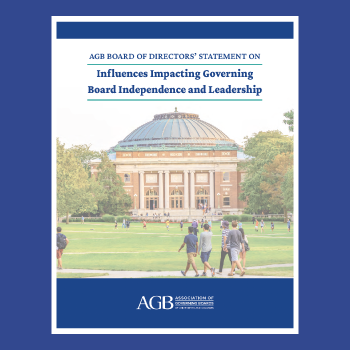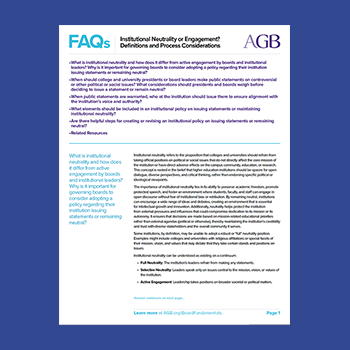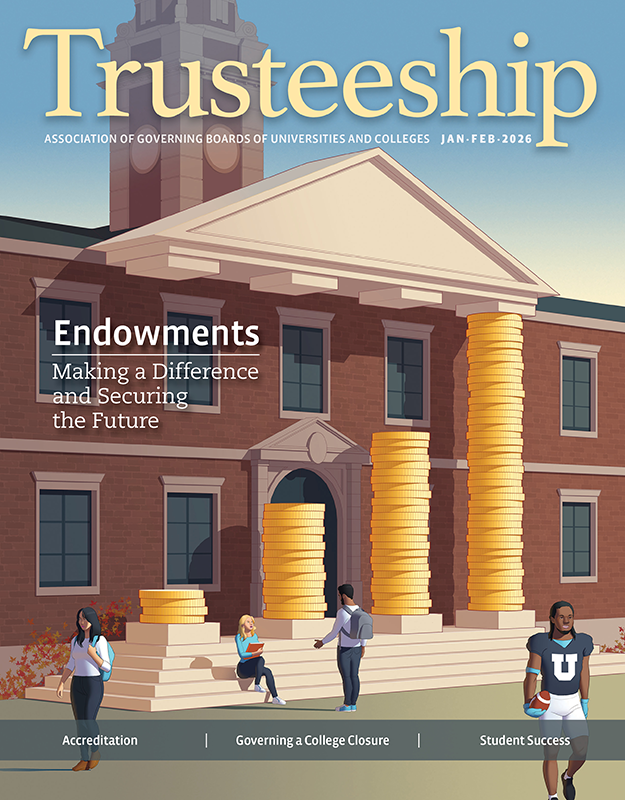Why this is important.
Board independence and institutional autonomy are fundamental to effective higher education governance. Colleges and universities are governed by lay citizens, not government officials or special interests, ensuring independence for institutional leadership. Governing boards act as both a buffer—protecting institutions from direct governmental control—and a bridge, representing the public trust. This independence is essential for maintaining the integrity and quality of higher education.
Institutional autonomy is closely linked to academic freedom and freedom of speech, allowing faculty members and students to pursue truth and scholarship without fear of reprisal. The board is the ultimate guarantor of both, ensuring decisions are mission-driven and not unduly influenced by external pressures from government, donors, or other stakeholders. Trustees are expected to represent the broad interests of society, safeguarding the institution’s mission and public trust.
As reliance on private gifts and corporate partnerships grows, boards must ensure these relationships do not compromise independence or academic priorities. Clear policies and vigilant oversight are vital to prevent inappropriate influence and uphold institutional integrity.
Sources: Higher Education Governing Boards: An Introductory Guide for Members of College, University, and System Boards, AGB 2019
AGB Board of Directors’ Statement on Influences Impacting Governing Board Independence and Leadership, AGB 2023
What’s at risk when boards lose their independence? In the immediate term, it affects the learning experience of students. Explore resources for boards seeking to safeguard their autonomy through the Govern NOW initiative.
Questions for boards.
Click below to reveal key questions for your board to consider:
Understanding and Safeguarding Institutional Autonomy
- Does the board understand its obligations to safeguard institutional autonomy?
- Do board members participate in the institutional accreditation process, receive and review reports from accreditation visiting teams, and understand how accreditation can reinforce board leadership and independence?
- Are there clear policies and procedures in place to prevent inappropriate external influence, particularly from government or donors?
Board Independence and Effective Governance
- Have board members consistently demonstrated independent judgment in matters involving stakeholder interests, such as those of elected officials, donors, alumni, and employees?
- Does the board operate cohesively, acting in unison after airing different views on governance and policy issues?
- How does the board monitor its own conflict-of-interest policies and ensure that it functions efficiently and effectively as an independent body?
- Do board members function openly and freely during meetings but support majority decisions in the end?
Alignment and Collaboration with Leadership
- Are the priorities of the president and the board aligned on crucial mission-related matters, and are these priorities evident in board agendas and committee work?
- Do trustees work together with the president to make decisions that serve the best interests of the institution rather than those of individuals or groups?
- Do the president and board operate together in a spirit of trust and mutual support?
- Has the board empowered the president to set policies or guidelines about when to take a public stance on behalf of the institution, and does the board support the president in these decisions?
Protecting Academic Freedom and Campus Climate
- Does the board understand the institution’s role in balancing academic freedom and freedom of speech, ensuring an inclusive campus climate for diverse opinions and viewpoints?
- Does the board avoid pressures to accede to partisan agendas, while also recognizing the importance of instilling civic virtues and strengthening democracy?
Recommended resources.
We carefully curated these staff-picked resources for you:
Board Independence and Neutrality
Podcast
Featuring Barbara McCuen Jones and Fram Virjee
2025
AGB

















